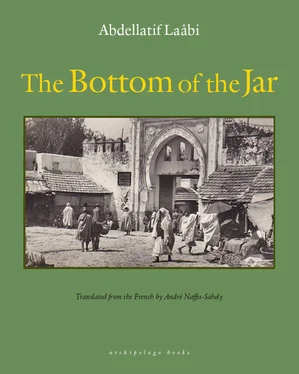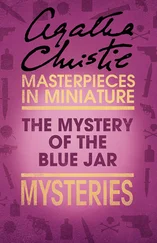Namouss hung on every word, scraping bits of knowledge together. Matters to do with other countries simply went over his head and he put these down to the natural order of things. History had yet to knock at the door of his consciousness. He waited impatiently for these serious discussions to come to a fortuitous end. If only Abdeslam Laïrini would suddenly show up with a suitcase in each hand! The man in question was a dedicated traveler originally from the north of the country, specifically from the town of Larache. Once a month he would go back and forth between Fez and the Spanish Zone, where he made a number of surprising purchases: soap bars in the shape of fruit (lemons, pears, bananas), Italian shoes, scarves and silk shirts, pajamas, bottles of Rêve d’Or and Tabu perfume, chocolate, tubes of toothpaste, toothbrushes, and — something that disconcerted Namouss — Spanish gargoulettes of unusual shapes and decoration. As soon as Abdeslam Laïrini entered the souk, many conversations came to an abrupt end. Everyone ran over to touch the merchandise, which for the most part sold out in a matter of minutes. For reasons unknown to Namouss, Driss rarely bought anything, so Namouss had to content himself with feasting his eyes. He was all ears too, since Abdeslam spoke with the singsong accent typical of the north. It was like hearing another language for Namouss, who had begun to develop a taste for new languages at school.
Yet there were days when nothing unexpected happened. The conversations dragged on. Becoming aware of how bored his son was, Driss would set him free.
“Go home,” he ordered him.
THE COMMAND JOLTED Namouss up from his extended reverie. He looked around to make sure Driss wasn’t anywhere in sight. A few shops had already opened. It was time to move on.
Where should he go now? It was barely noon, and he had to hold out until sundown. There was no choice but to continue on his peregrination. He left the Sekkatine souk, took a left, passed the Nejjarine fountain, and went down the alleyway that led to the rue des Pavés. Once there, he stopped in front of a shop that like the others was closed, though not for the same reason. In fact, the shop had been closed as long as anyone could remember and was shrouded in an aura of mystery. It was called the Prophet’s Shop, and it was said that God’s Beloved had once passed through there. The footprints he’d left behind were still etched in the ground. Namouss had often tried to peep inside the shop through a crack to see what went on in there but had never been able to make out anything in the pitch-dark. But today, distressed as he was, he was hoping for a miracle. He leaned against the door and looked through the crack. His need to be rescued was akin to a breath of air coming from inside the shop. He was moved by it. “Oh emissary of God,” he surprised himself murmuring, “get me out of this bad patch.” At that moment, he felt himself being shoved and violently crushed against the door. Grasping for something with which to catch his balance, his hand gripped the tail of an animal that had come out of nowhere. He realized that he’d come upon a heavily burdened donkey that had slipped on the cobblestones and had almost fallen on top of him. Luckily the donkey driver was there. Using his cudgel, the driver beat the animal until it got back on its feet, freeing Namouss, who was frightened rather than hurt. The driver, a little groggy, continued on his way.
Namouss needed some fresh air, and it was only natural he should think of the Jnan Sbil gardens. Namouss had a long walk ahead of him in order to get there, including a good uphill stretch: the rue des Pavés, then the Talaa Seghira, right up to Bab Boujeloud. “All the better,” he said to himself, “that will take up a few hours until it’s time for the Maghrib.” This new perspective invigorated him. He decided to stop loafing around and walk the distance to the gardens in a single go. Yet his overall vitality, though considerable, was now beginning to flag, standing in the way of his plan. At this time of day, thirst and hunger were making themselves painfully felt. Smokers and snuff-takers lose their patience when deprived of their vice. Their grouchiness becomes unbearable. They start to split hairs, fly off the handle at the slightest provocation, and vent their spleen. Altercations would break out here and there, which the idle followed with avid interest, idlers whose chief concern was to while away the hours until the breaking of the fast, an approach Namouss was already familiar with. Any distraction — in the strongest sense of the word — was welcome. There were two categories of idlers. First came the jokers, who loved adding fuel to the fire and who generally stood to the side so as to make a clean getaway if one of their jibes backfired and stirred a bruiser’s ire.
“Whose sebsi is this on the ground?”
“Whose snuffbox is this?”
“Light up and take a good drag.”
“The Maghrib is still far-far-far away and the maid is a piddling little child!”
The second category was made up of good souls who tended to break up fights and — thanks to copious quotations from the Qur’an — tried to bring the combatants back to reason. Although these mediators really did help keep the peace, this too was a means of whiling away the hours until the fast could be broken.
It was therefore curious to note the sudden interest a great number people took in being precise during this month when patience was celebrated as a virtue. From the time the sun passed its zenith, the questions people asked all circled the same pot.
“What time is it?”
“What time will Maghrib be today?”
“How long until the Maghrib?”
And, as if these weren’t enough, others who were even more anxious, would ask, “Are you sure your watch is working properly?”
Namouss had a hard time moving through that feverish crowd. He took care not to bump into anyone to avoid attracting the wrath of those mramden — as those “Ramadan sufferers” were called. He finally arrived at Bab Boujeloud. The way was clear.
THE JNAN SBIL gardens were a true haven of peace. The main avenue was lined with bushy Seville orange trees and flanked by two rows of basins where jets of water shot up and down, like dancers repeating an endless ballet choreographed by some invisible force. Namouss left the avenue behind and took a left. He crossed through a small forest of bamboo trees growing in the shadow of pines and giant palms. Here and there were some frail-looking datura sagging under the weight of their foul-smelling, bell-shaped flowers. A burbling brook could be heard, and at the end of the path, the garden’s majestic waterwheel came into view. It was turning slowly, as if stroking the surface of the water. Namouss sat on a bench and gave himself over to its movements, which soothed his heart. Lulled by the water’s swish, he wound up falling asleep. His dreams, alas, did not bring him any comfort, as they had little in common with the peace of his surroundings. An enormous weight pressed down on his chest while a series of images whirled through his head at breathtaking speed. Once again this nightmare.
This had happened a year ago. The episode had taken place in Aïn Allou, the road where the Small Springs were located. Unlike other times, he hadn’t gone there to see Chiki Laqraâ shower her invisible rival and assorted stone-hearted miscreants with insults. He had wound up there purely by accident. All around him were seditious murmurs. The crowd that had gathered in this back alley blocked the traffic. Men, children, and even young girls were chanting slogans.
“Down with colonialism!”
“Long live independence!”
Then something unimaginable happened: A young, unveiled girl was hoisted high above the crowd by two fellow protesters. Sweeping all objections aside, the girl launched into a song, which the crowd quickly echoed:
Читать дальше












